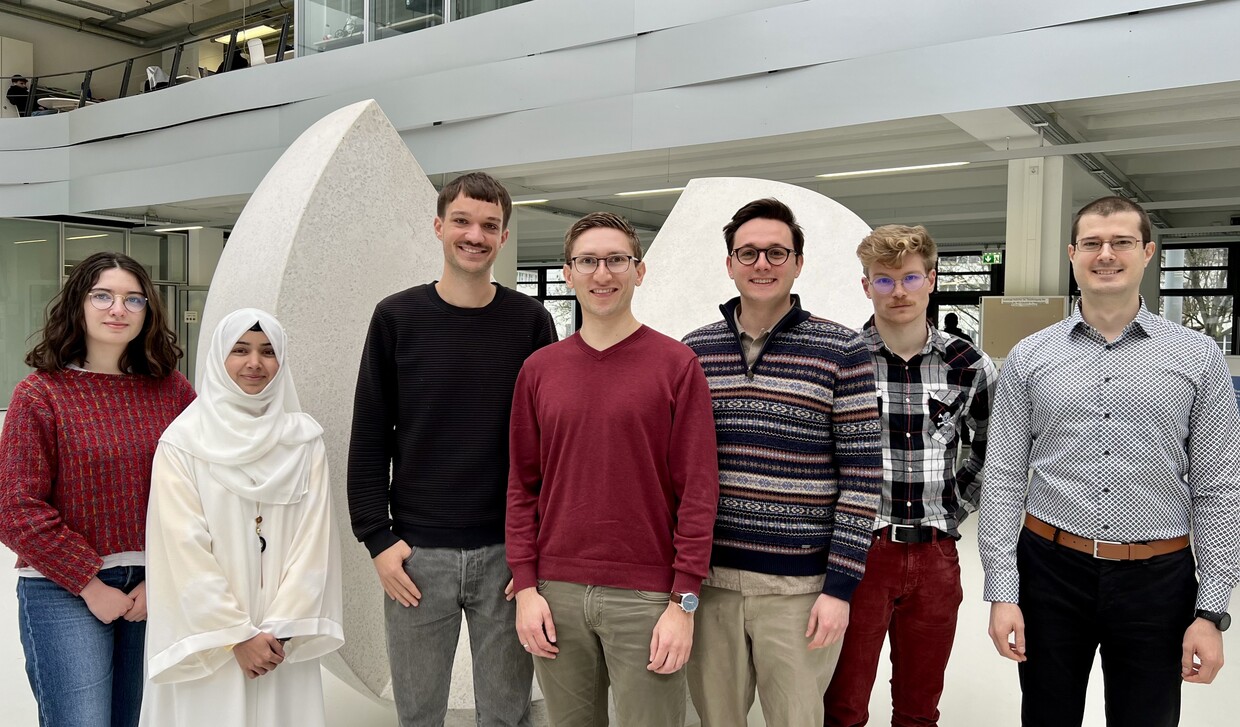Numerics of PDEs

The current team members from left to right: Clara Van Cauter, Sakina Ali, Tino Lück, Roland Maier, Dustin Mühlhäuser, Felix Krumbiegel, and Michael Crocoll.
Secretariat
Room 3.002 (3rd floor)
Opening hours (as a rule)
| Mon, Wed, Thu | 9 a.m. to 12 p.m. |
| Mon, Wed, Thu | 1 p.m. to 4 p.m. |
For urgent matters, please contact us in advance by email.
Contact
| Phone | +49 721 608-42061 |
| Fax | +49 721 608-43767 |
| numpde-sek∂math.kit.edu |
Our research group Numerics of PDEs develops and analyzes numerical methods for solving partial differential equations (PDEs). A particular focus are multiscale problems that can be modeled using PDEs with strongly varying coefficients. For such problems, we construct and investigate special tailor-made methods. In addition, we are interested in combining deep learning approaches with classical numerical methods. Moreover, we work on decoupling time discretization schemes for coupled PDEs.
We are a young and dynamic team that is always open to scientific exchange. If you are interested in writing a Bachelor or Master thesis, feel free to contact us.
News
- December 1, 2025: Sakina joins the team. Welcome!
- November 19, 2025: Roland was awarded the KIT Leadership Certificate. Congrats!
- October 31, 2025: Dustin and Michael successfully acquired three NVIDIA deep learning certificates of competency. Congrats!
- October 1, 2025: Tino joins the team. Welcome!
- June 27, 2025: Felix receives the SIAM UKIE award for his presentation at the Biennial NA Conference. Congratulations!
| Name | Title | Room | Phone | |
|---|---|---|---|---|
| Maier, Roland | TT-Prof. Dr. | CS 20.30 3.009 | +49 721 608-46954 | roland maier ∂does-not-exist.kit edu |
| Name | Title | Room | Phone | |
|---|---|---|---|---|
| Ali, Sakina | M.Sc. | CS 20.30 3.022 | +49 721 608-43350 | sakina ali ∂does-not-exist.kit edu |
| Crocoll, Michael | M.Sc. | CS 20.30 3.012 | +49 721 608-46972 | michael crocoll ∂does-not-exist.kit edu |
| Lück, Tino | M.Sc. | CS 20.30 3.014 | +49 721 608-43349 | tino lueck ∂does-not-exist.kit edu |
| Mühlhäuser, Dustin | M.Sc. | CS 20.30 3.012 | +49 721 608-46972 | dustin muehlhaeuser ∂does-not-exist.kit edu |
Localized methods for the wave equation with strong heterogeneities in space and time
This project is about the development of a multiscale method for the efficient simulation of wave phenomena in strongly heterogeneous media. Such phenomena can be described by the acoustic wave equation with strongly oscillating coefficients in space and time. We develop novel multiscale strategies in time and combine them with spatial discretization approaches based on deep learning.
The project is funded by the German Research Foundation (DFG) within the CRC 1173 Wave Phenomena from 2025 to 2027. For further information, see CRC project A15 and DFG GEPRIS.
Numerical Methods for Parabolic Multiscale Problems
High-order hybrid multiscale methods for rough heterogeneous structures
This project focuses on the reliable combination of multiscale methods and hybrid discretization techniques for approximating PDEs with strongly oscillating coefficients. The aim is to combine the favorable properties of both methodologies in order to develop techniques that are naturally localized and allow for higher-order convergence rates. The focus is on both the theoretical analysis of the methods and their practical implementation.
The project is funded by the German Academic Exchange Service (DAAD) from 2024 to 2025.
| Titel | Links | Dozent*innen | Typ |
|---|---|---|---|
| Sommersemester 2026 | |||
| Numerical Analysis on Quantum Computers | Maier | Vorlesung (V) | |
| Tut. for Numerical Analysis on Quantum Computers (0183600) | Maier | Übung (Ü) | |
| Proseminar | Maier, Unger, Lück | Proseminar (PS) | |
| AG Numerik von PDEs | Maier | Seminar (S) | |
| NuMaKa Seminar | Maier, Krumscheid, Unger | Oberseminar (OS) | |
| Wintersemester 2025/26 | |||
| Übungen zu 0101100 (Einstieg in die Informatik und algorithmische Mathematik) | Krause, Doll, Lück | Übung (Ü) | |
| Übungen zu 0108700 (Numerische Mathematik 1) | Dörfler, Karch, Mühlhäuser | Übung (Ü) | |
| Numerical Analysis of Neural Networks | Maier | Vorlesung (V) | |
| Tutorial for 0166100 (Numerical Analysis of Neural Networks) | Maier, Crocoll | Übung (Ü) | |
| Seminar (Scale-Bridging Numerical Methods) | Maier, Hauck, Krumbiegel | Seminar (S) | |
| AG Numerik von PDEs | Maier | Oberseminar (OS) | |
| Sommersemester 2025 | |||
| Analytical and Numerical Homogenization | Maier | Vorlesung (V) | |
| Tutorial for 0165700 (Analytical and Numerical Homogenization) | Maier, Krumbiegel | Übung (Ü) | |
| Proseminar | Dörfler, Mühlhäuser | Proseminar (PS) | |
| Seminar (Selected Topics on Finite Elements) | Maier, Krumbiegel, Crocoll | Seminar (S) | |
| Wintersemester 2024/25 | |||
| Finite Element Methods | Maier | Vorlesung (V) | |
| Tutorial for 0110300 (Finite Element Methods) | Maier, Krumbiegel | Übung (Ü) | |
| Sommersemester 2024 | |||
| Numerical Analysis of Neural Networks | Maier | Vorlesung (V) | |
| Tutorial for 0166100 (Numerical Analysis of Neural Networks) | Maier, Krumbiegel | Übung (Ü) | |
